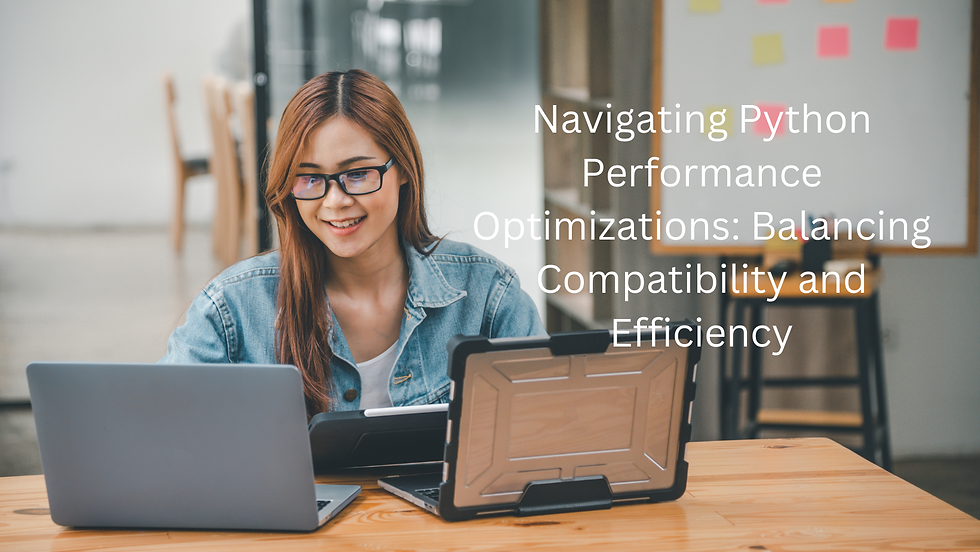Navigating Python Performance Optimizations: Balancing Compatibility and Efficiency
- k86874248
- May 10, 2024
- 3 min read

Introduction:
Python, renowned for its simplicity and versatility, serves as a go-to language for developers across various domains. However, due to its interpreted nature, Python sometimes lags in performance. This is where performance optimizations come into play, aiming to enhance the efficiency of Python code. Nonetheless, like any optimization process, there exists a delicate balance between efficiency and compatibility. Let's delve into how Python performance optimizations can impact compatibility and how to navigate these challenges effectively.
Understanding Python Performance Optimizations:
Python performance optimizations aim to accelerate code execution or reduce memory usage. These optimizations range from simple code refactorings to leveraging advanced libraries and tools like Cython or Numba. While significantly boosting performance, these techniques may also introduce compatibility issues, particularly when dealing with different Python versions, platforms, or libraries.
Addressing Compatibility Concerns:
Python Version Compatibility: Python evolves with each release, introducing new features, optimizations, and occasionally deprecating old ones. Optimizations reliant on newer Python features might not seamlessly function with older versions, potentially causing compatibility issues across different environments.
Platform Dependencies: Python code optimized for a specific platform or operating system might not operate optimally or even run on different platforms. Dependencies on system-specific libraries or hardware configurations can impede cross-platform compatibility.
External Library Compatibility: Python's rich ecosystem relies on numerous third-party libraries. While leveraging these libraries can enhance performance, it also introduces the risk of compatibility issues, especially when updates or changes are made to the libraries.
Mitigating Compatibility Issues:
Conduct Version Compatibility Checks: When implementing performance optimizations, ensure compatibility across different Python versions by conducting thorough testing. Utilize tools like tox or virtual environments to automatically test code across multiple Python versions.
Write Platform-Independent Code: Whenever possible, develop platform-independent code. Avoid relying on system-specific libraries or hardware configurations unless absolutely necessary. Utilize abstractions provided by libraries like NumPy or TensorFlow for tasks involving hardware-specific optimizations.
Manage Library Versions Effectively: Maintain clear documentation regarding the versions of external libraries used in your project. Specify dependencies accurately in requirements files and utilize version pinning to ensure consistency across environments.
Implement Continuous Integration (CI) and Continuous Deployment (CD): Automate compatibility testing and deployment processes through CI/CD pipelines. Integration with platforms like GitHub Actions or Jenkins can aid in identifying and resolving compatibility issues early in the development cycle.
Engage with the Python Community: Foster engagement with the Python community through forums, mailing lists, or social media channels. Seek advice from experienced developers and contribute by reporting compatibility issues or sharing solutions.
Case Studies and Best Practices:
Case Study: Optimizing a Machine Learning Model
Scenario: Optimizing a machine learning model for real-time inference.
Approach: Utilize libraries like TensorFlow or PyTorch for model optimization.
Best Practice: Validate model performance across different Python versions and hardware configurations using benchmarking tools.
Case Study: Improving Web Application Performance
Scenario: Enhancing the performance of a web application built with Django.
Approach: Implement caching strategies, optimize database queries, and utilize asynchronous programming.
Best Practice: Test application compatibility across various web servers and Python versions using automated deployment pipelines.
Conclusion:
Python performance optimizations play a crucial role in enhancing the efficiency of Python code. However, ensuring compatibility across different environments is equally important. By adopting best practices such as conducting version compatibility checks, developing platform-independent code, and effectively managing library versions, developers can navigate compatibility issues effectively while maximizing the benefits of performance optimizations. Remember, achieving the right balance between efficiency and compatibility is key to delivering robust and scalable Python applications. For those seeking to delve deeper into Python optimization techniques, enrolling in a Python Training Course in Lucknow, Gwalior, Indore, Delhi, Noida, and all locations in India can provide invaluable insights and practical skills.



Comments